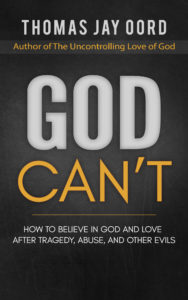God Doesn’t Punish
I don’t think God ever punishes. But I do think there are natural negative consequences to sin and evil. I spell out what this means in my book, God Can’t: How to Believe in God and Love after Tragedy, Abuse, and Other Evils.
 Although the idea God punishes is largely absent in the New Testament, numerous passages describe the pain, destruction, and confusion that sin and evil cause. The apostle Paul says, for instance, “The wages of sin is death.” Biblical writers warn of “the wrath to come.” Sin and evil lead to destruction of various kinds.
Although the idea God punishes is largely absent in the New Testament, numerous passages describe the pain, destruction, and confusion that sin and evil cause. The apostle Paul says, for instance, “The wages of sin is death.” Biblical writers warn of “the wrath to come.” Sin and evil lead to destruction of various kinds.
Victims know personally, of course, that others can intentionally harm. And we can intentionally hurt ourselves. We don’t need the Bible to know evil sucks!
Old and New Testament writers speak of God’s anger (wrath) or sorrow (grief) when humans treat others and creation wrongly. God knows there are harmful aftereffects for abusive, oppressive, and corrupt actions. God knows evil sucks!
Does God Decide Whether to Allow Pain or Prevent It?
Unfortunately, many think God freely decides whether to administer the damaging consequences of sin and evil. They think God deliberately chooses whether to allow wrongdoing to wreak havoc.
“Let me see,” God muses, “should I let the hammer fall or protect her from sin’s painful effects?” In this way of thinking, God sometimes protects us from the pain sin causes but other times does not.
This way of thinking leads to questions victims know so well! If God always loves, why doesn’t God always protect us from pain and suffering? Why doesn’t God stop the horrors that come from evils others inflict? If God voluntarily chooses to allow the harm that comes from evil, wouldn’t a loving God prevent most of that harm if not all of it?
Fortunately, there’s a better way to interpret the pain, chaos, and destruction that follows sin. This better way accounts for the brokenness following wickedness. It’s a more helpful explanation for the wages of sin than believing God allows or causes death. That better way says…
Natural Negative Consequences
There are natural negative consequences to sin.
Rather than believe the suffering, devastation, and heartache from wrongdoing are supernatural punishments, we should believe they’re the natural negative consequences of refusing to cooperate with God’s love. Rather than think God sometimes consents to sin’s effects and other times does not, we should think sin and evil naturally result in ruin.
God knows what makes life good. So God calls us to act and live in ways that promote the good life. Love promotes well-being, and failure to love promotes ill-being. Refusing to cooperate with what makes life good leads to harm.
That’s just the way things work in a cause and effect universe.
God isn’t the Universal Spanking Machine who hits disobedient children. God is the loving Parent who loves everyone and calls every creature to love. God does not sometimes decide to protect us and other times lets the hammer fall. God always acts to protect us to the greatest extent possible. But there are natural negative consequences – for others and ourselves – when we ignore divine beckoning to love.
Sin is often its own punishment. Evildoers hurt themselves because doing evil means self-inflicting harm. The old saying, “you reap what you sow,” captures this truth. Evildoers suffer from self-inflicted wounds, whether psychological, physical, or spiritual, because sin destroys the sinner.
Doing evil also hurts others. In an interrelated universe, the actions of one – for good or ill – affects others. Innocent victims suffer too. To create a new saying, “you reap what others sow.” Victims know the truth of this new saying.
In sum, the wicked never prosper. They may seem to prosper in the short term. But wickedness, sin, and evil always result in natural negative consequences that hurt us all.
God and Natural Disasters
We make better sense of life when we realize sin has natural negative consequences. But sometimes nobody causes our suffering. No one sinned, not others and not us. Sometimes pain and anguish come, and no one’s to blame. We are victims of natural disasters, random sickness, or bad luck.
Those who believe in a punishing God are quick to claim natural disasters, freak accidents, or unexplained illnesses are divine punishment. If they cannot detect a human cause for some event, they assume God did it. Insurance companies call natural disasters “acts of God,” for instance, and some say God causes sickness as reprimand for sin. A destructive hurricane, tsunami, earthquake, or volcanic eruption always prompts someone, somewhere to say, “the Gods must be angry!”
To counter these claims, we must remind ourselves of a belief I’ve addressed in my book, The Uncontrolling Love of God, and in numerous blog essays: God can’t control others, because God’s love is uncontrolling. That includes not controlling the weather, viruses, inanimate objects, and nature more generally. Consequently, God can’t prevent evil singlehandedly, including natural disasters, chance occurrences, and more.
I’ve also explored in other blog essays God’s uncontrolling love in relation to the myths and realities of healing. In a universe where the actions of the biggest creatures, smallest entities, and forces of nature matter, God works to persuade all creation to health and wholeness. Given the evils we and others endure, it’s good to know God loves all creation, and doesn’t control any of it.
Thank goodness, God is not in control!
God Doesn’t Have a Divine Body
God is a universal spirit without a localized body. This means, among other things, God literally can’t be a Spanking Machine, because God has no hands or body parts with which to spank.
God cannot through divine bodily impact cause a hurricane or volcanic eruption. Nor can God literally step in front of a hurricane or sit on volcano to stop them. God cannot actually use a divine finger to stop a virus or rearrange rocks in a landslide. God doesn’t have a divine body.
Because God is loving, God can’t control others. Because God is spirit, God cannot exert bodily impact. God can’t punish through controlling nature or bodily impact.
Other agents, entities, forces, and processes – large or small – are active in the unive rse. God cannot control them nor does he singlehandedly determine outcomes. Creaturely agents, entities, forces, and processes sometimes cause harm. We should blame them for natural disasters, freak accidents, unexplained illnesses, and more.
rse. God cannot control them nor does he singlehandedly determine outcomes. Creaturely agents, entities, forces, and processes sometimes cause harm. We should blame them for natural disasters, freak accidents, unexplained illnesses, and more.
There are natural negative consequences to sin and natural negative accidents, illnesses, and disasters in nature.

Comments
I agree with your point. Thank goodness that God is not in control, because, if God was in control, he would be the cause of the evil and pain our world experiences each day.
However, I can’t find it in me to thank goodness that God doesn’t possess the power or ability to stop evil and suffering. I appreciate that Priestly writer roots divine sovereignty in humanity in Genesis 1:26-28 perhaps, (to go along with your thesis) because we have localised bodies that can physically respond to evil and suffering. However, I don’t know if I find yet can find it ‘good news’ that God is a weak power because humanity is so often the cause of evil and suffering. A God whose only real strength is the power to persuade us towards good is one I personally struggle to be moved towards in worship.
I guess this is part of my process towards what Richard Kearney calls the anatheistic moment where we must lose the all-powerful God of metaphysics in order to find a deeper experience in our return to God (after God).
Great Post! Much food for thought. Still trying to wrap my brain around God unable to intervene because of uncontrolling love but then miracles. Purchased book Rethinking The Bible.
I appreciate your honesty, Corey. And I admit I’ve struggled with this too. It helps me to remember that although God cannot control, God is still almighty in at least three senses: the mightiest of all, the source of might for all, and the one who exerts might on all. While I think love should be our primary motivation for worship, the almighty God I describe in these three ways has no rivals in power.
Another way I sometimes think of this is to compare Mother Teresa to the world’s champion body builder. Mother Teresa is far more powerful because of the love she inspires.
Tom
Thanks, Mike!
Thanks for this great article. I have posted this with additional commentary here:
How much does God control?
Excellent, Michael!
“Other agents, entities, forces, and processes – large or small – are active in the universe. God cannot control them nor does he singlehandedly determine outcomes. Creaturely agents, entities, forces, and processes sometimes cause harm. We should blame them for natural disasters, freak accidents, unexplained illnesses, and more.”
This God sounds eerily familiar, like the Monad of the second century Gnostic teachers.
Charles – My view isn’t Gnostic. Have you had a chance to read my books that explain my view. You might start with The Uncontrolling Love of God.
I see that “Creaturely agents, entities, forces, and processes sometimes cause harm. We should blame them for natural disasters, freak accidents, unexplained illnesses, and more.” Let’s say that’s all the “bad stuff”. Does God get any credit for the “good stuff”? Does God have any agency in this theology; i.e., does God heal people from illnesses caused by malevolent agents entities and forces?
Dave, In my view, God gets credit for the “good stuff.” God inspires and calls us to love. And God has ultimate agency. It’s just that God can’t singlehandedly stop the evil the creatures and creation cause.
Tom, let me ask this question as directly as I can: in your theology of love, can God singlehandedly (miraculously, if you will), heal people from illnesses? Taking this question just a bit further, in your theology of love, is our prayer to God for healing an intervening factor that “helps” (for a lack of a better term) God to thwart the “evil” of the illness? Thanks again.
Dave – In my view, God cannot heal others singlehandedly. God uses various factors, actors, and cooperators — which can include our prayers — when working to heal.
I offer several thoughts on this:
A Loving God would NEVER punish. A Loving God seeks to heal His or Her children. And as you note, doing or even thinking evil cases one spiritual harm, so all who do evil WILL need healing! I was surprised that this point was not the focus of this blog.
Also, the focus of the blog seems to be on physical success, physical harm, and physical interventions. But its premise, that one suffers harm from doing evil, is generally NOT true physically. Instead, in the physical world, murderers and genociders survive and leave offspring, and own the possessions of the murdered and genocided!
An alternate way of thinking about this is to take Love and morality seriously as essential aspects of the universe. Embrace a Love Virtue as an aspect of one’s self, and one will have and share love and joy, and experience this Love and Joy in intimate union with God. Abandon Love, and embrace harm, fear, and hatred, and one will find oneself in the company of the spirits which embrace harm, fear and hatred, and one will share that with them, intimately. Love and hatred as virtues then become the MOST IMPORTANT aspects to our universe, and physical status is insignificant relative to them.